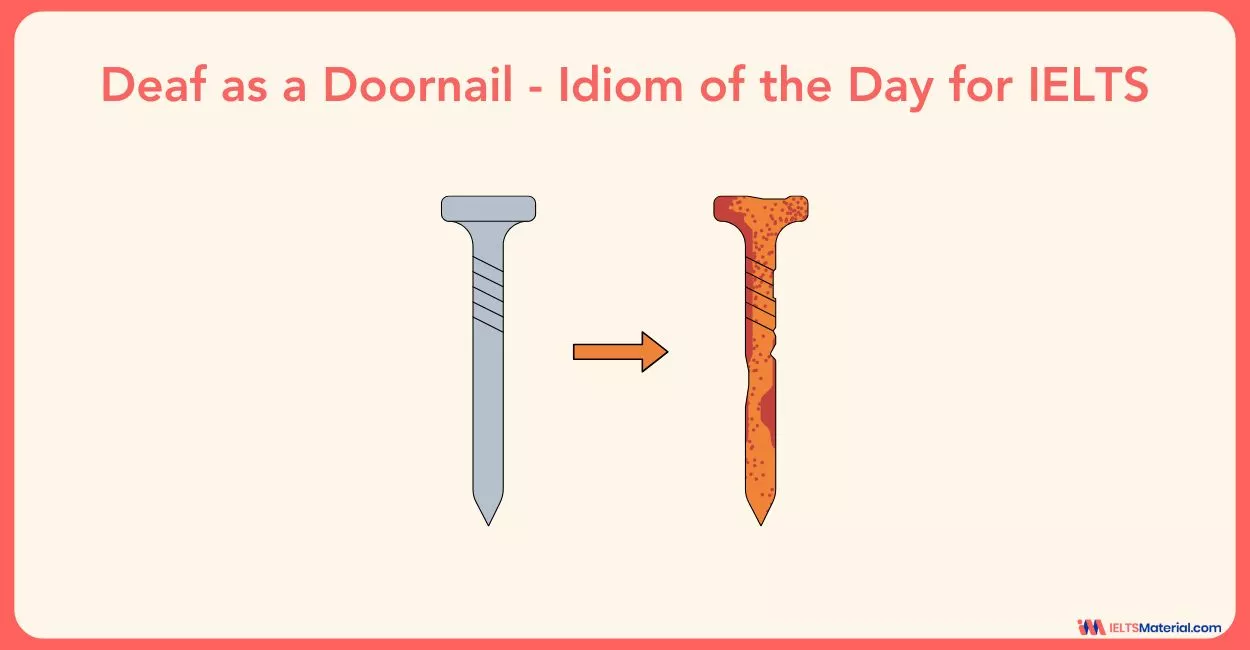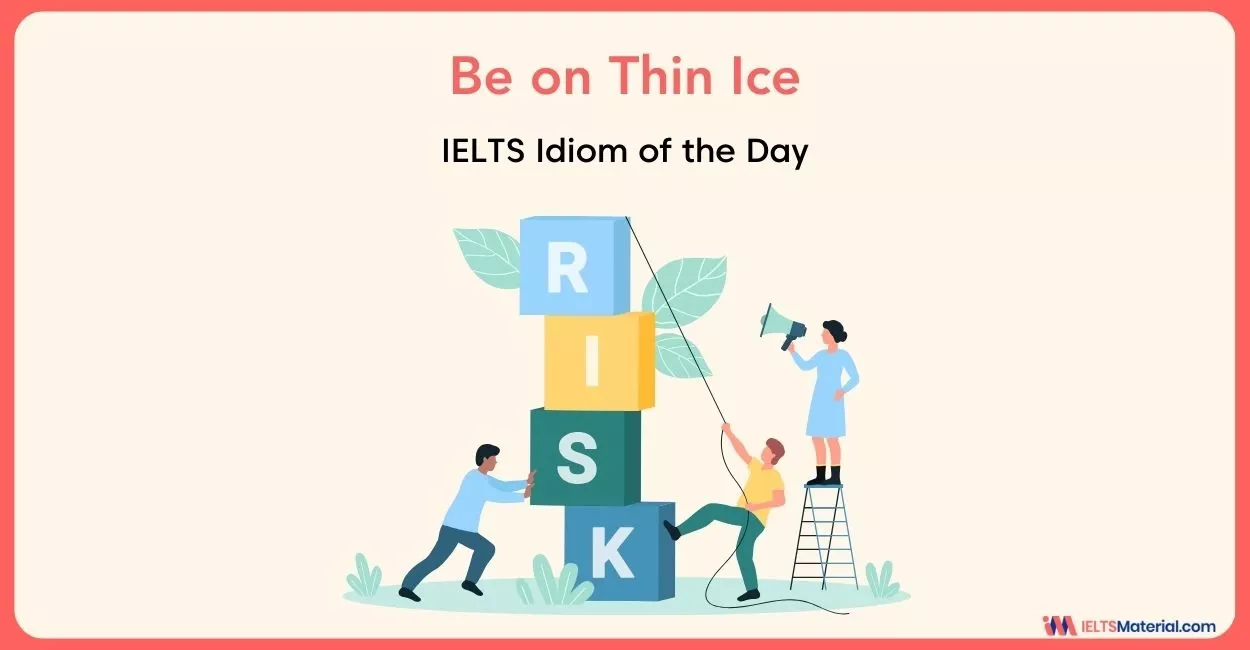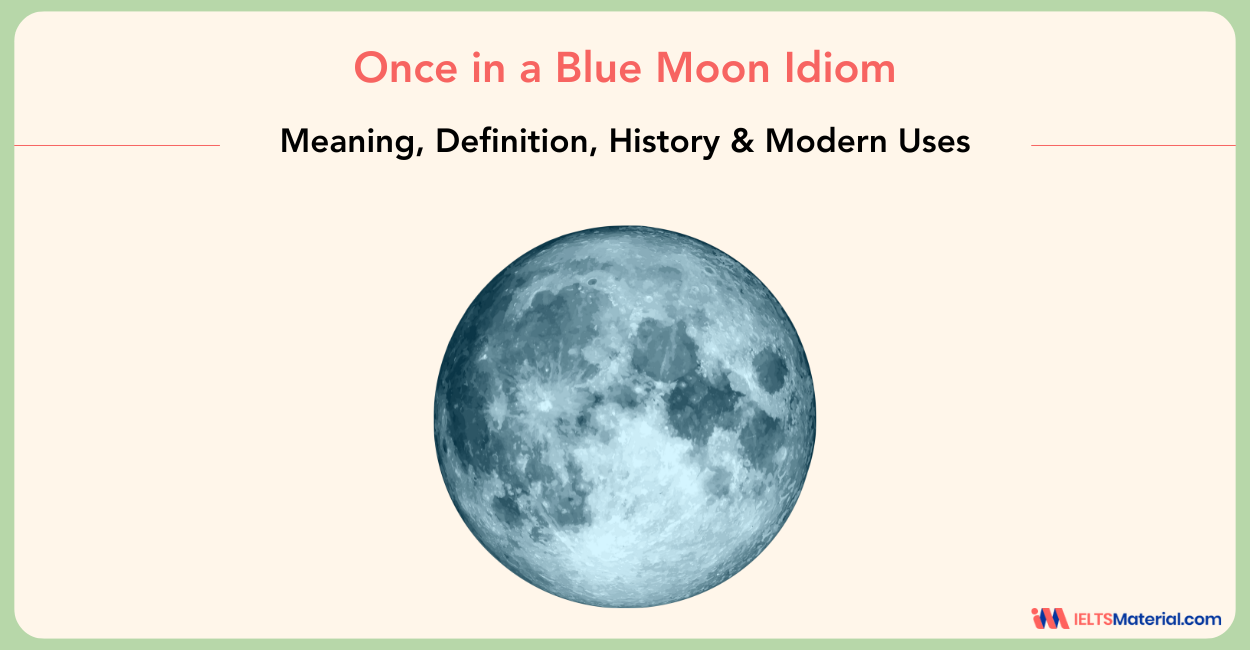Be on Thin Ice Idiom: Meaning, Origin, Usage & Exercises
The idiom ‘be on thin ice’ means to be doing something that is dangerous or involves risks. This blog explains the meaning, history, and usage of the idiom, including examples and practice exercises to help you master it and boost your IELTS vocabulary.
Table of Contents

Limited-Time Offer : Access a FREE 10-Day IELTS Study Plan!
Imagine walking on a thin layer of ice that can crack with any wrong move and how dangerous the situation can be. It is literally what the idiom ‘be on thin ice’ means or expresses. So, while describing a danger or a risky situation for IELTS, you can definitely use this idiom to add more depth, making your answers more precise and impactful.
In this blog post, we will explore the meaning, origin, and usage of the idiom ‘be on thin ice’, one of the common idioms in IELTS Speaking, and take up exercises to cement your understanding.
Be on Thin Ice Idiom: Meaning
The idiom ‘be on thin ice’ means to be in a risky or dangerous situation where even a small mistake could lead to serious consequences.
It suggests being in a delicate position where caution is essential. In everyday usage, it is used to warn someone that they are close to trouble or danger.
Origin of Be on Thin Ice Idiom
The phrase originates from the literal danger of skating or walking on frozen water. Ice can appear solid, but if it is too thin, it may crack and collapse, putting a person’s safety at risk.
- Earliest Uses: Traced back to the 17th century, often in relation to skating or crossing rivers in winter.
- Metaphorical Shift: By the 19th century, the idiom had developed its figurative meaning of being in a risky or unstable situation.
- Modern Context: Today, it is widely used in professional, academic, and casual contexts to highlight danger, uncertainty, or potential failure.
Be on Thin Ice Idiom Usage
Below are some examples of how the idiom, be on thin ice, can be used in everyday conversations.
- Taking a gap year after finishing high school is becoming a hot trend for the youngsters. Some people think it is on thin ice.
- After missing several deadlines, the employee knew he was on thin ice with his manager.
- By joking about such a sensitive topic, she was definitely skating on thin ice.
- His reckless investments left the company financially on thin ice.
- The company is already facing financial troubles, so delaying this project puts us on thin ice.
- If you fail one more exam, you’ll be on thin ice with the university administration.
- The government’s controversial policy has placed it on thin ice with the international community.
Book IELTS online classes to learn new vocabulary for the IELTS test!
Be on Thin Ice Idiom: Synonyms and Related Phrases
In the table below, you will find the common idioms list for IELTS Speaking related to the idiom ‘be on thin ice’.
|
Idiom/Expression |
Meaning |
Example Sentence |
|---|---|---|
|
Walking a Tightrope |
being in a delicate, risky situation where balance is essential |
The negotiator was walking a tightrope between both countries’ demands. |
|
Playing with Fire |
taking unnecessary or dangerous risks |
By lying in court, he was clearly playing with fire. |
|
In Hot Water |
being in trouble |
She found herself in hot water after breaking the company rules. |
|
On Shaky Ground |
being in an unstable or uncertain situation |
His argument is on shaky ground without evidence. |
|
Treading on Dangerous Ground |
doing something risky or provocative |
You’re treading on dangerous ground by criticizing the boss so openly. |
Join a FREE online webinar to learn how to boost your IELTS vocabulary for success!
Be on Thin Ice Idiom: Detailed Usage in IELTS Contexts
In everyday English, the idiom ‘be on thin ice’ is often used to describe risky situations or precarious decisions. As a result, for IELTS learners, mastering this idiom can enrich both speaking and writing tasks, especially when describing challenges or uncertain scenarios.
You will find a few examples of how you can use the idiom 'be on thin ice' effectively in IELTS contexts.
IELTS Speaking Part 2
- Cue Card Topic: Describe a time when you took a risk and what the outcome was.
- Answer Excerpt: “During my final year in university, I decided to start a side business while preparing for my exams. It felt like I was on thin ice because a single distraction could have affected my academic results. Luckily, I managed my time well and succeeded in both areas.”
IELTS Writing Task 2
- Question: Some people believe that taking risks is necessary for personal growth, while others think it is better to avoid danger. Discuss both views and give your opinion.
- Answer Excerpt: Taking calculated risks is often part of success. However, individuals must recognize when they are on thin ice, as reckless decisions can cause irreversible damage.
Be on Thin Ice Idiom: Practice Exercise
In the following exercises, you will learn how to properly use the idiom 'be on thin ice' and apply it appropriately.
Exercise A: Choose the correct option.
1 Which situation best illustrates ‘being on thin ice’?
A Studying hard for an exam.
B Borrowing money from a strict teacher without permission.
C Cooking a meal for your family.
D Taking a safe bus ride to school.
2 Which sentence uses the idiom incorrectly?
A He was on thin ice after failing to meet the project deadline.
B Walking across the frozen river felt like being on thin ice.
C I was on thin ice while sunbathing at the beach.
D Criticizing her boss in public put her on thin ice.
3 What is the closest meaning to ‘be on thin ice’?
A To be in a safe zone.
B To be in danger of making a mistake.
C To be surrounded by friends.
D To be completely successful.
4 Which professional scenario best matches the idiom?
A A CEO ignoring financial warnings from auditors.
B A teacher explaining grammar rules.
C A doctor prescribing medicine with precision.
D A student winning a scholarship.
5 Identify the correct replacement for the idiom: “After the scandal, the minister was on thin ice with the public.”
A The minister was in hot water with the public.
B The minister was in a safe position with the public.
C The minister was walking a tightrope with the public.
D Both A and C.
Explore our Vocabulary for IELTS to amp up your vocabulary for IELTS!
Be on Thin Ice Idiom: Answer Key for Practice Exercise
1 B
2 C
3 B
4 A
5 D
To conclude, the idiom ‘be on thin ice’ is a vivid way of expressing danger, uncertainty, or risk. As a result, using this idiom effectively can demonstrate advanced vocabulary and impress examiners. In short, if you do not want your English to be ‘on thin ice’, make idioms a regular part of your learning to boost your IELTS vocabulary!
Useful Links:
- Upset the Applecart Idiom: Meaning, Origin, Usage & Exercises
- Grasping at Straws Idiom: Meaning, Origin, Usage & Exercises
- Turn Turtle Idiom: Meaning, Origin, Usage & Exercises
- English Pronunciation in Use (Intermediate Edition) PDF by Mark Hancock
- IELTS Academic High-Frequency Vocabulary Words
- Useful Resources & Websites for IELTS Vocabulary
Explore IELTS Resources

Start Preparing for IELTS: Get Your 10-Day Study Plan Today!
Check out other Idioms

Haniya Yashfeen

Haniya Yashfeen
Recent Articles

Kasturika Samanta

Prity Mallick

Nehasri Ravishenbagam







Post your Comments